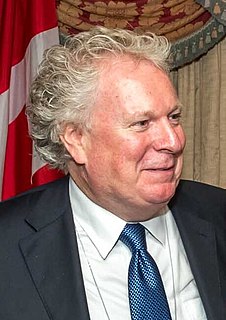A Quote by Marshall Goldsmith
Active questions are the alternative to passive questions. There is a huge difference between, 'Do you have clear goals?' and 'Did you do your best to set clear goals for yourself?' The former is trying to determine the employee's state of mind; the latter challenges the employee to describe or defend a course of action.
Related Quotes
As with all catalysts, the manager's function is to speed up the reaction between two substances, thus creating the desired end product. Specifically, the manager creates performance in each employee by speeding up the reaction between the employee's talent and the company's goals, and between the employee's talent and the customer's needs.
If you're trying to be miserable, it's important you don't have any goals. No school goals, personal goals, family goals. Your only objective each day should be to inhale and exhale for sixteen hours before you go to bed again. Don't read anything informative, don't listen to anything useful, don't do anything productive. If you start achieving goals, you might start to feel a sense of excitement, then you might want to set another goal, and then your miserable mornings are through. To maintain your misery, the idea of crossing off your goals should never cross your mind.
One dictionary defines denouement as "a final part in which everything is made clear and no questions or surprises remain." By that definition, it is exactly the wrong word to describe this chapter. This chapter will make nothing clear; it will raise many questions; and it may even contain a surprise or two. But I say we call it the denouement anyway because the words sounds so sophisticated and French.
We need to set goals for ourselves. Start today...if you don't have any goals, make your first goal getting some goals. You probably won't start living happily ever after, but you may start living happily, purposefully, and with gratitude...Goals are gratitude in action. They give us the opportunity to build on what we already have. While achieving goals can be a lengthy process, we can learn to be grateful for each stage in the process of setting and meeting goals.
The sense of loss of control over what happens to you at work (and thus in your life is vital). This further involves a sense of fairness as in, I did my part and look where it got me! "The deal," the contract between employee and employer has eroded and been replaced with unilateral power by the organization over the employee.



































